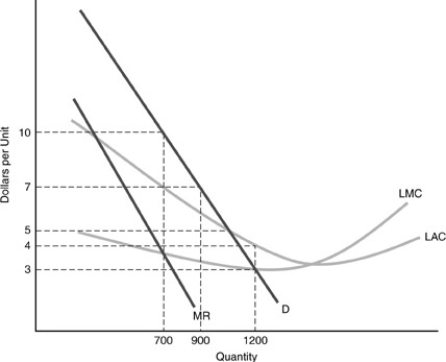Exam 27: Regulation and Antitrust Policy in a Globalized Economy
Exam 1: The Nature of Economics347 Questions
Exam 2: Scarcity and the World of Trade-Offs411 Questions
Exam 3: Demand and Supply448 Questions
Exam 4: Extensions of Demand and Supply Analysis399 Questions
Exam 5: Public Spending and Public Choice359 Questions
Exam 6: Funding the Public Sector202 Questions
Exam 19: Demand and Supply Elasticity413 Questions
Exam 20: Consumer Choice457 Questions
Exam 21: Rents, Profits, and the Financial Environment of Business445 Questions
Exam 22: The Firm: Cost and Output Determination387 Questions
Exam 23: Perfect Competition431 Questions
Exam 24: Monopoly386 Questions
Exam 25: Monopolistic Competition309 Questions
Exam 26: Oligopoly and Strategic Behavior302 Questions
Exam 27: Regulation and Antitrust Policy in a Globalized Economy309 Questions
Exam 28: The Labor Market: Demand, Supply and Outsourcing374 Questions
Exam 29: Unions and Labor Market Monopoly Power316 Questions
Exam 30: Income, Poverty, and Health Care302 Questions
Exam 31: Environmental Economics299 Questions
Exam 32: Comparative Advantage and the Open Economy313 Questions
Exam 33: Exchange Rates and the Balance of Payments300 Questions
Select questions type
If a public service commission requires a natural monopoly to set its price equal to the long-run marginal cost, this will result in
(Multiple Choice)
4.9/5  (37)
(37)
Acme Inc. found a tricky way to conform to the letter of the law with respect to new EPA regulations, even though they violated the spirit of the law. This is called
(Multiple Choice)
4.7/5  (39)
(39)
The theory that regulators' behavior will eventually be compromised by the special interests they regulate is known as the
(Multiple Choice)
4.9/5  (39)
(39)
The behavior of regulators when trying to win approval for their actions from their entire constituency is best described by the
(Multiple Choice)
4.9/5  (37)
(37)
"Unfair or deceptive acts or practices in commerce" were prohibited by the
(Multiple Choice)
4.9/5  (46)
(46)
U.S. government regulation of social and economic activity
(Multiple Choice)
5.0/5  (40)
(40)
The "primary motive" of regulators, according to the share-the-gains, share-the-pains theory, is to
(Multiple Choice)
4.9/5  (36)
(36)
The first antitrust law that the U.S. Congress enacted was
(Multiple Choice)
4.9/5  (41)
(41)
This agency is responsible for protecting consumers from products posing fire, electrical, chemical, or mechanical hazards or dangers to children.
(Multiple Choice)
4.8/5  (43)
(43)
A theory of regulatory behavior, which states that regulators must take into account the preferences of legislators, producers, and consumers, is the
(Multiple Choice)
4.8/5  (41)
(41)
The U.S. antitrust enforcers determine whether a merger violates antitrust laws by examining
(Multiple Choice)
4.9/5  (41)
(41)
Under the U.S. system of regulation, most regulars are selected from
(Multiple Choice)
4.8/5  (31)
(31)
 -Which of the following is the BEST example of a natural monopoly?
-Which of the following is the BEST example of a natural monopoly?
(Multiple Choice)
4.9/5  (41)
(41)
Showing 161 - 180 of 309
Filters
- Essay(0)
- Multiple Choice(0)
- Short Answer(0)
- True False(0)
- Matching(0)